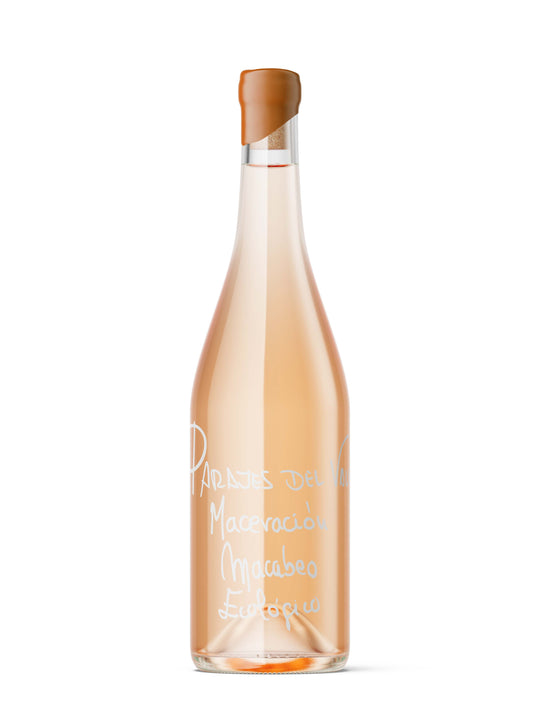PDV0623OW
Macabeo Maceracion
2023
Manchuela
Certified Organic
Wild yeasts
Low Sulphur
Vegan
DO Manchuela is a large area in the centre of Spain, east of Cuenca and Albacete, and has 70 towns in Castilla La Mancha. It is bordered by other Designations of Origin: La Mancha in the west, Jumilla in the south and Almansa and Utiel-Requena to the east. The soil is composed of clay on limestone and the average height of the vineyards are between 600-700 meters. Another unevenness that deeply marks the surface of the area are the two large reservoirs to the north of the cultivation area, Alarcón and Contreras, which allow an abundance of irrigation. These are all very favourable conditions for vine cultivation.
Parajes del Valle is a dynamic new winery, founded in 2018 and led by winemaker María Jover, whose experience includes a stint at Vega Sicilia. At just 28, she brings a fresh, modern approach to Jumilla’s winemaking traditions. The winery works exclusively with certified organic Monastrell from old vines (15–40 years), spread across four plots: Fuente de las Perdices, La Cañada de Albatana, and Término de Arriba in northern Jumilla. These vineyards are maintained under the traditional terraje system, where growers rent the land and return 7% of the harvest in exchange for tending the vines. Though this system sustains many of Jumilla’s oldest vineyards (80–90 years), it is increasingly under threat from modern irrigation practices. Parajes del Valle is committed to preserving terraje, even paying above market price to ensure the highest quality fruit. Fermentation starts in stainless steel before finishing in concrete tanks, allowing the wine to naturally clarify and stabilise over winter.

Wine details
PDV0623OW
Parajes del Valle
Macabeo Maceracion
2023
Manchuela
Certified Organic
Wild yeasts
Low Sulphur
Vegan
DO Manchuela is a large area in the centre of Spain, east of Cuenca and Albacete, and has 70 towns in Castilla La Mancha. It is bordered by other Designations of Origin: La Mancha in the west, Jumilla in the south and Almansa and Utiel-Requena to the east. The soil is composed of clay on limestone and the average height of the vineyards are between 600-700 meters. Another unevenness that deeply marks the surface of the area are the two large reservoirs to the north of the cultivation area, Alarcón and Contreras, which allow an abundance of irrigation. These are all very favourable conditions for vine cultivation.
Parajes del Valle is a dynamic new winery, founded in 2018 and led by winemaker María Jover, whose experience includes a stint at Vega Sicilia. At just 28, she brings a fresh, modern approach to Jumilla’s winemaking traditions. The winery works exclusively with certified organic Monastrell from old vines (15–40 years), spread across four plots: Fuente de las Perdices, La Cañada de Albatana, and Término de Arriba in northern Jumilla. These vineyards are maintained under the traditional terraje system, where growers rent the land and return 7% of the harvest in exchange for tending the vines. Though this system sustains many of Jumilla’s oldest vineyards (80–90 years), it is increasingly under threat from modern irrigation practices. Parajes del Valle is committed to preserving terraje, even paying above market price to ensure the highest quality fruit. Fermentation starts in stainless steel before finishing in concrete tanks, allowing the wine to naturally clarify and stabilise over winter.
